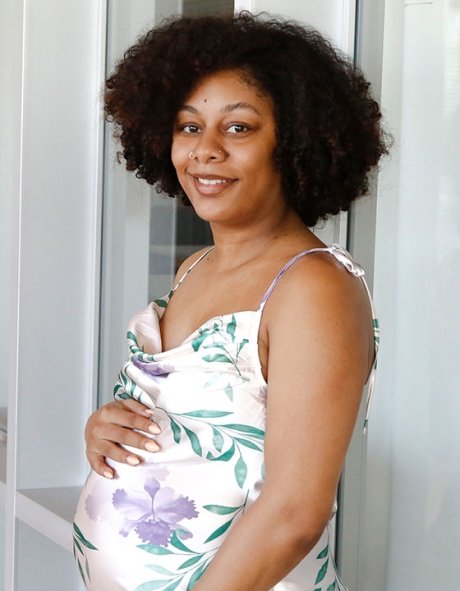
The death of a young, pregnant Black woman inspired her lifework.
“Black women have the highest maternal mortality rate in the United States. More than white women and any other racial group,” says RIC senior Maria Prout (pictured above).
A wife and mother of two, Prout is expecting her third child in July. She is a certified doula, serving pregnant mothers, and is graduating this May with a major in health sciences and a minor in medical anthropology.
Her interest in Black maternal health began in 2019 when 27-year-old Lashonda Hazard, a pregnant Black woman, died at Women & Infants Hospital.
According to screen shots of Hazard’s text messages, she went to the hospital seeking help for severe abdominal pain but was sent home.
In her text messages, she writes, “I’ve been having excruciating stomach pain cramps and they’re not doing anything about it. My whole left stomach is hard and in pain. I’m literally dying.”
Hazard died a day later.
“After her death, I began poring through research on Black maternal health,” Prout says.
Among other startling facts, she found that in the United States, Black women are two to three times as likely as white women to die due to complications related to pregnancy. What’s more, more than 80 percent of pregnancy-related deaths are preventable.
“It doesn’t matter their level of education or income status,” she says, maternal deaths for Black women are disproportionately higher. “The root cause,” says Prout, “is structural racism. But it’s also been found that doulas improve maternal health outcomes.”
Doulas are not medically trained but they treat the physical, emotional and educational needs of a woman not only during pregnancy but during preconception and postpartum. During labor, for instance, a doula will help a woman manage contractions, suggest different labor positions and act as a coach.
Research shows that with doulas, the rates of cesarean deliveries are reduced and women are less likely to experience a birth complication.
“After reading on this, I decided to take doula classes and get certified,” Prout says. She took an eight-day doula training at Uzazi Village and joined a collective of Black doulas called the Umoja Nia Collective.
“Once I became a doula, I wanted to do more,” she says.
Prout enrolled at RIC to major in health sciences, with a minor in medical anthropology. “My program laid the foundation for graduate work in midwifery,” she says. Prout will begin her master’s degree program in midwifery at Thomas Jefferson University. This is a three-year, part-time, online program that will allow her to become a certified midwife.
Certified midwives are medically trained to deal with pregnancy, childbirth, newborn care and postpartum health. Prout will be able to prescribe medications and provide routine reproductive care like pelvic exams, Pap tests or counseling on birth control. She will be able to practice at hospitals, clinics, birth centers or at her clients’ homes. And she is free to focus on holistic care.
“My hope is to fill the gap,” Prout says, “to be someone who looks like you and listens to your concerns.”
During her tenure at RIC, she was mentored by alumna Alison Meola ’19, a nursing major who became a midwife. They met through RIC’s CEO Program, which matches current students with alumni mentors who work in the students’ field of study.
“For an entire year, Alison and I met via Zoom to discuss my professional and personal goals,” Prout says. “She helped me apply to midwifery school and offered to have me come shadow her.”
The CEO Program also offers monthly workshops, with presentations by experts in their field.
“We had workshops on diversity, equity and inclusion; financial literacy; résumé building; tips on how to get over your fear of public speaking; tips on interviewing for a job. It literally was a year’s worth of learning and networking with people from different fields, listening to their experiences and how those experiences led to their current career,” she says.
Prout is eager to begin her own career as a midwife. She’s practical when it comes to advice for pregnant mothers:
“Get a doula. Make sure you are being heard by your provider. Make sure your concerns are being addressed. Make sure you’re getting the answers you need. And if your provider isn’t supplying those answers, find another provider who you can align with. It’s important to do what’s best for you.”
